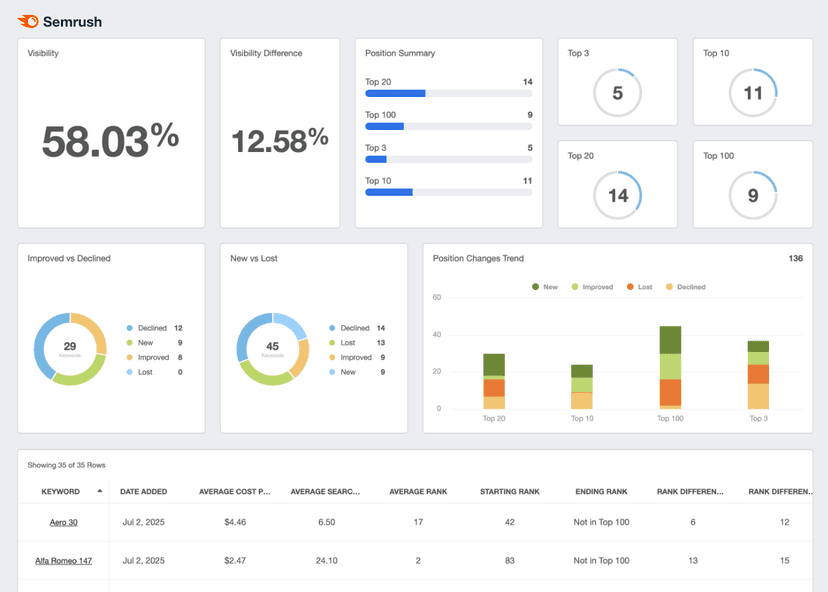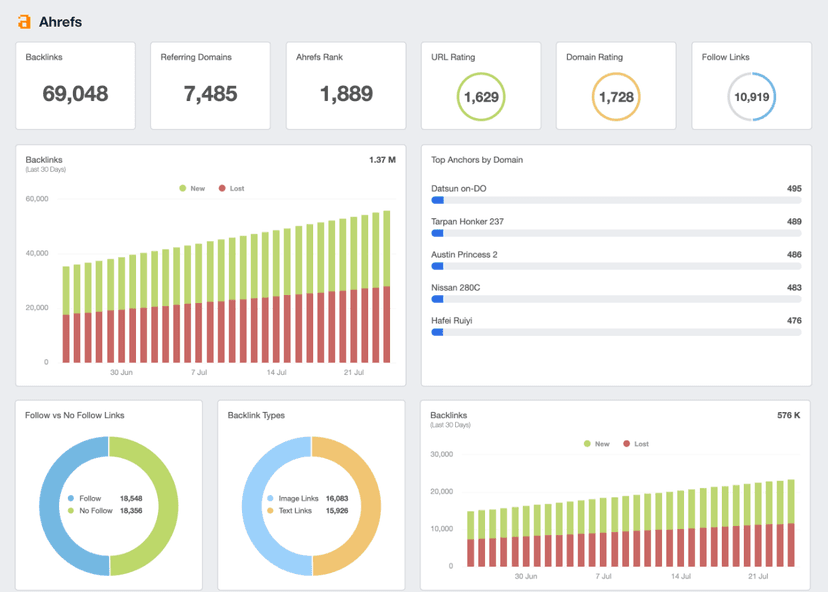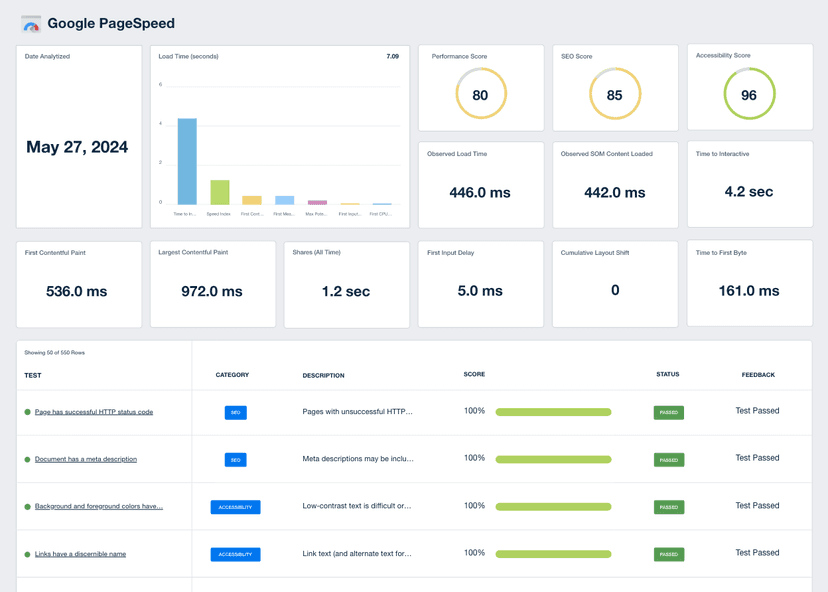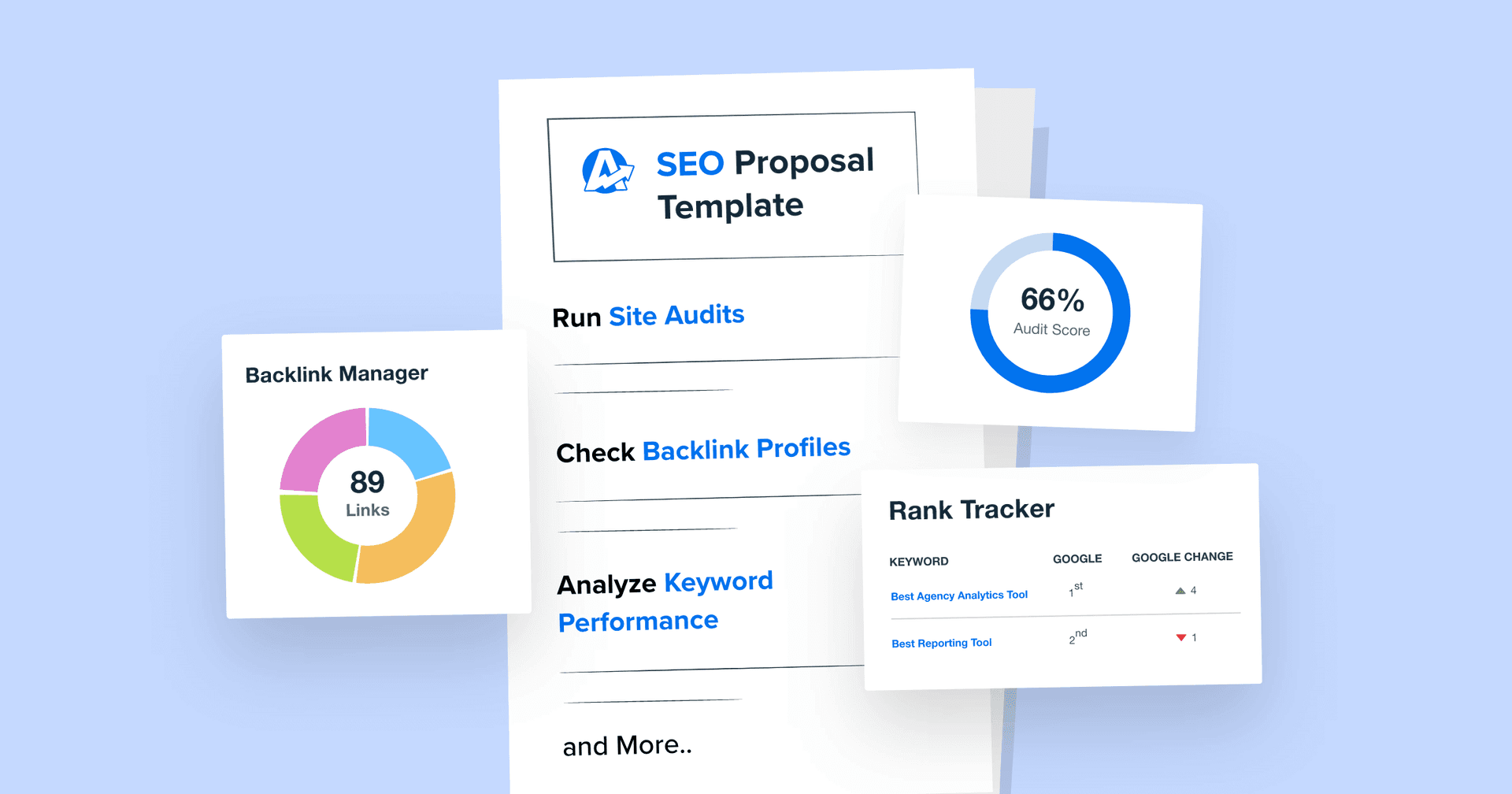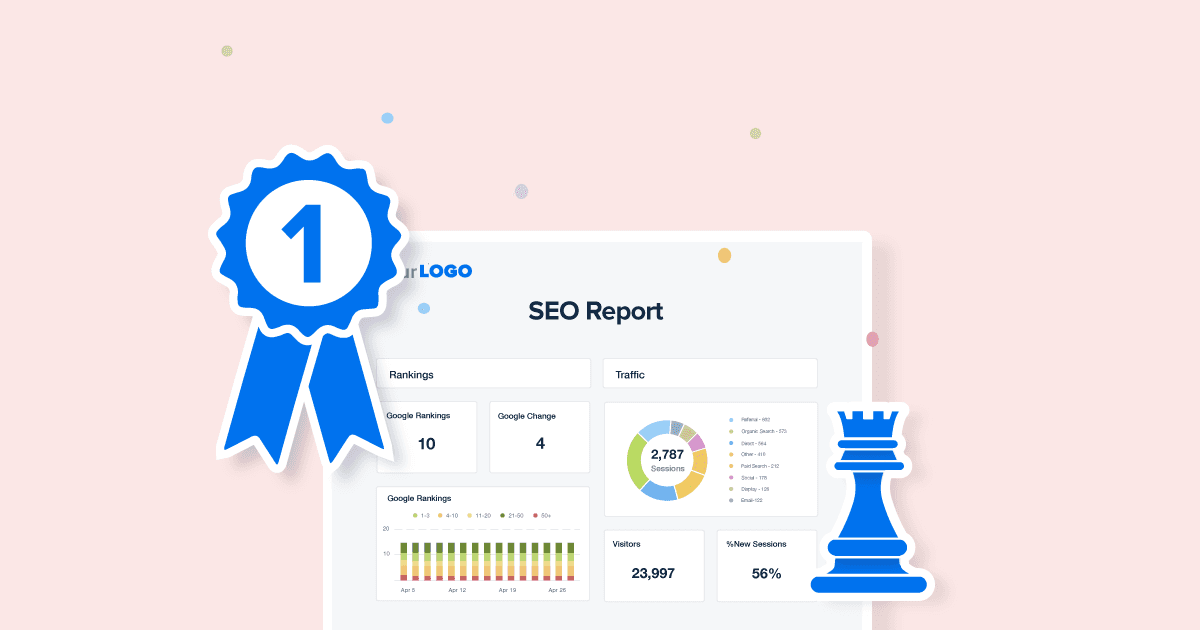SEO Score
Identify SEO Weakness
Use this score to detect areas of a website that require SEO improvements.
Enhance User Experience
Improve website usability and structure to enhance user engagement.
Assess Backlinks
Evaluate the quality and impact of backlinks on the overall SEO Score.
Adjust Technical SEO
Address technical SEO elements like site speed and crawlability.
Why SEO Score Is Important
SEO Score is a critical metric that directly influences a website's search engine rankings. It provides a clear, quantifiable measure of a site's optimization status. Regularly tracking this score means identifying areas for improvement, such as keyword additions and acquiring credible backlinks.
A high SEO Score also improves a site’s search visibility and perceived credibility. It’s an indispensable tool to help align efforts with SEO best practices and industry standards.

Stop Wasting Time on Manual Reports... Get SEO Insights Faster With AgencyAnalytics
How SEO Score Relates To Other KPIs
SEO Score gains more relevance when analyzed alongside other key performance indicators (KPIs). For example, it’s closely tied to Organic Traffic since a high SEO Score typically correlates with more website visits from search engines. This metric also impacts a website’s Conversion Rate. That’s because effective optimization attracts more high-quality leads and better Engagement Rates. A strong SEO Score also comes in handy for local businesses that rely on high search visibility, user endorsements, and in-person foot traffic.
Additionally, SEO Score is influenced by the quality and quantity of backlinks. A strong backlink profile increases content relevance and is prioritized by Google and other search engines, leading to better website performance.

Top Factors That Impact SEO Score
A site's SEO Score reflects its overall optimization for search engines. Factors affecting this include on-page SEO optimization and technical SEO health. On-page elements like meta tags, headings, and keyword usage play a key role. Proper use of these elements ensures that search engines understand the content and structure of a site.
Technical aspects also significantly impact the score. Mobile usability, web page load speed, and secure connections (HTTPS) are critical elements to optimize. Regular audits using a paid or free SEO checker help maintain technical SEO health, ensuring all aspects work seamlessly together to boost the overall SEO Score.

SEO is long-term, and for good reason. Never rush something just to get it out the door. Focus on quality over quantity, both in terms of links and the output to get those. For example, it can take only one backlink to tip the balance of the scales and make Google pay attention. It has to be a very authoritative site, but it’s not always about quantity.
How To Calculate SEO Score
SEO Score is typically calculated by specialized SEO tools such as Google Lighthouse. Various factors are considered, such as keyword relevance, backlink quality, site structure, and mobile-friendliness.
These tools analyze a website's adherence to SEO best practices and aggregate the findings into a single score.
What Is a Good SEO Score?
A good average SEO Score is typically 80+. This result indicates that a website is well-optimized and adheres closely to SEO best practices.
It also suggests practical keyword usage, strong backlink profiles, optimal site structure, and positive user engagement. A website with this score or higher is generally well-positioned in search results and attracts higher Organic Traffic.
What Is a Bad SEO Score?
A bad average SEO Score is usually below 50. This low score highlights significant issues in a website's SEO strategy. This may include poor keyword optimization, weak backlinks, or technical problems (e.g., slow site speed).
Websites scoring in this range may struggle to rank well in search results. Over time, this leads to reduced visibility and lower organic traffic.
How To Set SEO Score Benchmarks and Goals
To set benchmarks and goals for SEO Scores, begin by analyzing the current performance of a website. Focus on keyword rankings, Organic Traffic levels, and backlink profiles. Research industry standards and competitors to establish realistic benchmarks.
Use this data to set realistic goals (e.g., increasing Organic Traffic by a certain percentage). Regularly review these goals and adjust based on performance data and evolving SEO practices.
Additionally, examine whether there’s a relationship between SEO Score and conversion-driven metrics. This tactic may help to back-calculate revenue targets and set benchmarks.
Why SEO Score Matters to Clients
For clients, SEO Score shows their website's market visibility and demonstrates potential for attracting Organic Traffic. A high SEO Score typically means a website is well-optimized for search engines. This improves its visibility in search engine results pages (SERPs), making it more likely for potential customers to find the site.
Compared to paid advertising, Organic Traffic driven by good SEO practices is more cost-effective for clients in the long run. Once a high ranking is achieved, it can provide sustained traffic without the ongoing costs associated with Pay-per-Click (PPC) advertising. Websites that rank higher in search results are also perceived as more credible and trustworthy by users, helping clients stand out in competitive markets.

Why SEO Score Matters to Agencies
For agencies, a strong SEO Score shows the efficacy of their strategies and proves their expertise to clients. By showing improvements in SEO Scores, an agency justifies the return on investment (ROI) of their services. Clients are more likely to continue investing in SEO if they see tangible results, such as increased traffic and higher rankings.
Regularly monitoring and presenting SEO Scores allows agencies to track progress. Ongoing analysis is crucial for adapting strategies to algorithm changes or market shifts. Changes to this score enable agencies to offer well-informed recommendations on content, website design, and technical SEO.

Importance of Using an SEO Checker to Manage a Website's SEO Score
A strong website SEO Score is a critical element in attracting organic search traffic. This is where SEO site checkup tools, including some free SEO checkers, come in handy. An SEO checker analyzes the current state of a website and acts as a guide to improve the overall SEO Score. The best SEO checkers will cover various aspects of on-page SEO and overall technical SEO health.
By consistently using a website SEO checker, you gain valuable insights into critical search engine optimization opportunities like keyword usage, meta tags, and mobile usability.
Think of a website SEO Score checker as a report card for online presence. It provides actionable data that helps maintain optimal SEO performance and stay ahead of the curve. With regular SEO Score checks, you ensure the entire website adheres to evolving SEO standards and best practices.
Discover the Reporting Tool Built for Marketing Agencies
Best Practices When Analyzing and Reporting on SEO Score
Effective reporting on SEO Score is essential for optimizing websites. To improve campaign performance, adopt these reporting best practices and identify areas for enhancement.
Verify SEO Score Accuracy
Ensure that the SEO tools and the methods used for calculation are reliable. Regularly cross-check data sources to minimize discrepancies and ensure the SEO Score is accurate.
Track SEO Score Progression
Monitor SEO Score over time to understand the effectiveness of strategies. Regular analysis helps identify trends, assess the impact of changes made, and guide future optimization efforts.
Benchmark SEO Scores
Compare SEO Scores across different channels to identify which ones perform best. Use these insights to optimize content, replicate successful SEO campaigns, and build a solid online presence.
Contextualize SEO Performance
Report SEO Score alongside related metrics like Organic Traffic, Trust Flow, Citation Flow, and Conversion Rates. Use this to offer a comprehensive SEO analysis that considers all moving parts.
Display SEO Score Trends
Use graphs and charts to clearly illustrate SEO data. Where possible, add annotations to data visualizations for more context (e.g., explaining how a specific SEO campaign resulted in more traffic).
Suggest SEO Improvements
Include actionable steps based on SEO Score analysis. Include additional recommendations to complement SEO efforts (e.g., running an adjacent PPC campaign).
Most of our clients run many services with us across SEO and advertising. It was complicated to combine all of the data before AgencyAnalytics. Now, it’s much easier to condense the results of our efforts into dashboards or automated reports. It paints a better picture of the entire marketing funnel and has all the features we need.
FAQs About SEO Scores and Search Engine Optimization
Still have questions about improving a client’s SEO score? From how Google Lighthouse evaluates technical elements to the best way to interpret results, these answers help marketing agencies optimize for better rankings and an improved user experience—without digging through multiple platforms for answers.
Check any website's SEO score using Google Lighthouse, a tool that simulates how search engine bots evaluate a web page. If you're managing multiple sites, AgencyAnalytics integrates directly with Lighthouse to automatically pull each page’s SEO score into a centralized dashboard—no manual checks required.
Lighthouse highlights key SEO issues like missing tags, blocked resources, and Core Web Vitals—all of which impact visibility. It's a valuable tool because it simulates how search engines see a web page and flags technical errors that affect performance. Agencies can use it to prioritize fixes at scale.
It's best practice to check the SEO score monthly or or whenever you make major changes to a website's structure, added new content or structured data, or resolved technical issues. Frequent checks help you catch problems that prevent search engines from indexing a site properly and measure improvements over time.
Lighthouse calculates SEO scores based on whether a web page meets best practices for discoverability and technical health. This includes checking meta titles, descriptions, structured data, anchor texts, and if the page is indexable by search engines.
Prioritize the most important pages—those that drive traffic, conversions, or represent core services. AgencyAnalytics makes it easy to filter Lighthouse scores by page so you quickly identify SEO issues on the pages that matter most.
A website's SEO score reflects how easily search engines can crawl and understand a specific page. A high score builds trust with Google, supports content optimization, and leads to better rankings. Tracking SEO scores in AgencyAnalytics helps ensure every page meets those standards.
An SEO score is a subset of broader search engine optimization. It measures whether a specific page meets technical best practices—things like meta tags, indexability, and load speed. While SEO score offers a quick overview, full search engine optimization also includes keyword targeting, backlinks, and content strategy.
Most free SEO checkers give generic, surface-level advice and don’t align with how Google Lighthouse calculates SEO score. Lighthouse is free, but it's also the benchmark Google uses to evaluate technical elements like structured data and URL structure. As a professional agency, your clients expect more than they could get from a browser-based tool. To actually improve SEO scores, you need tools that interpret and help improve Lighthouse data in a way that will positively impact search engine crawlers—such as the technical SEO audit tools Semrush, Ahrefs, or Moz (to name a few). And of course, you need a professional reporting platform to help analyze and share the results of your SEO efforts.
Google Lighthouse Dashboard Example
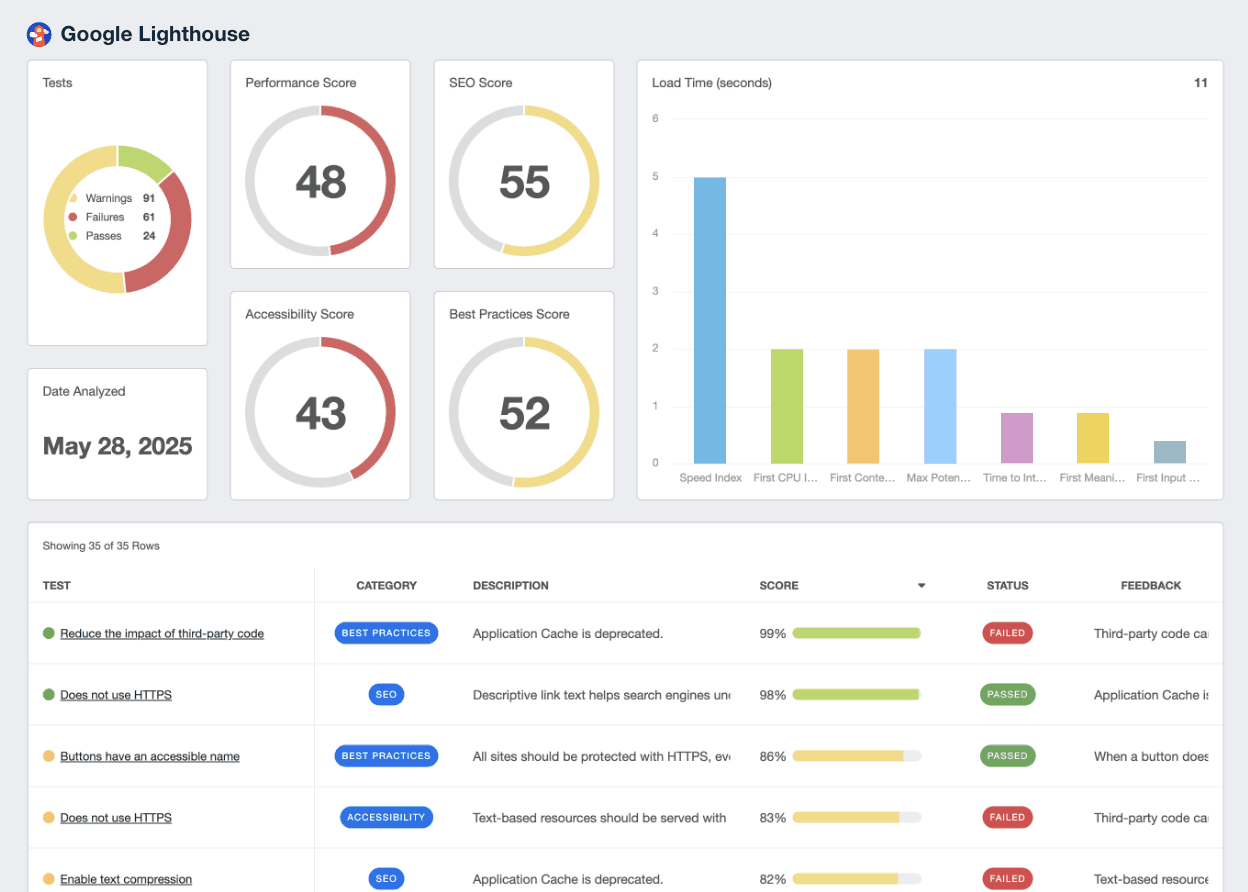
Related Integrations
How To Improve SEO Score
Smart SEO tactics drive more Organic Traffic and enhance online visibility. Here are a few strategies to boost SEO Score and climb search engine rankings.
Revamp Keyword Strategy
Focus on integrating relevant, high-volume keywords naturally within content. Populate SEO-related elements like metadata for increased visibility.
Acquire Quality Backlinks
Prioritize high-quality backlinks from reputable websites. Engage in guest blogging, collaborate with influencers, or create shareable content.
Conduct SEO Audits
Perform regular SEO audits to identify and fix issues. This includes checking for broken links, optimizing site structure, and ensuring content freshness.
Related Blog Posts
See how 7,000+ marketing agencies help clients win
Free 14-day trial. No credit card required.


